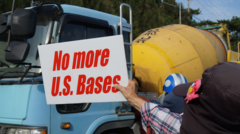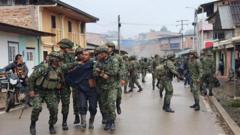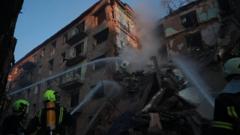Nationwide protests in Kenya have resulted in a climb in the death toll to 16, with widespread injuries reported as citizens express frustration over corruption and police brutality. Demonstrators faced off against security forces, and the protests have reignited concerns over government accountability.
Death Toll Rises in Kenya Amid Ongoing Protests Against Government Actions

Death Toll Rises in Kenya Amid Ongoing Protests Against Government Actions
A leading human rights group reports increasing fatalities as protests erupt nationwide in Kenya, highlighting issues of corruption and police violence.
Stones and debris still littered the streets of Nairobi on Thursday as reports confirmed that the death toll from Wednesday's protests in Kenya had reached 16. The nationwide demonstrations were ignited by public discontent over government corruption and police brutality, drawing thousands of citizens who rallied under the banners of justice and accountability.
Local reports indicated that clashes erupted between demonstrators and security forces, who responded with live ammunition, rubber bullets, and tear gas. Amnesty Kenya, led by executive director Irùngũ Houghton, provided the updated death toll, revealing that most casualties resulted from gunshot wounds, including that of Fred Wamale Wanyonyi, a security guard at Kenya Power’s headquarters.
In addition to the fatalities, over 400 individuals suffered injuries, including more than 80 people with severe wounds, according to a coalition of human rights organizations. The Kenya National Police have not issued a response regarding these developments.
Eyewitness accounts noted that unrest extended to various regions, with reports of police stations being set ablaze and shops looted. As the aftermath settled across the capital, businesses gradually reopened, navigating through streets filled with remnants of protest-related debris while shopkeepers remained wary of discussing the events due to fear of government backlash.
The government had previously imposed a ban on live media coverage of the protests, a decision met with backlash from press and rights advocates. Content shared on the messaging app Telegram was also restricted, leading to legal actions that later lifted the ban on broadcasts.
These protests follow last year’s uprisings that resulted in over 60 deaths, with significant human rights violations subsequently reported. Citizens expressed persistent frustration over a lack of economic opportunities and a corrupt political landscape, issues that have not diminished and continue to fuel unrest under the presidency of William Ruto.




















